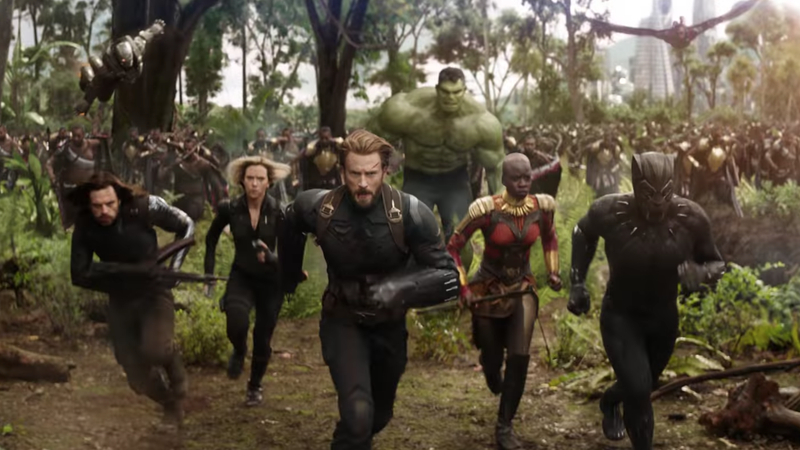A New Ruling Could Make 'Deceptive' Movie Trailers a Target For Legal Action

- Oops!Something went wrong.Please try again later.
- Oops!Something went wrong.Please try again later.
When two fans of Ana de Armas rented Yesterday after seeing de Armas in the trailer, only to realize at the end of the movie that her part had been cut, they were so unhappy that they went to court over it. And won. In a rather bizarre Free Speech case, a federal judge has ruled in favor of movie-goers over the protests of Universal Studios, saying that studios cannot release “deceptive movie trailers.”
The two de Armas fans, Conor Woulfe and Peter Michael Rosza, each paid $3.99 to rent Yesterday, an alternate-history speculative film about the disappearance of The Beatles, on Amazon Prime. de Armas’ part was cut after filmgoers responded that they didn’t enjoy the fact that the main character’s love interest (played by Lily James) had competition in the form of de Armas’ character. Woulfe and Rosza are seeking “at least $5 million as representatives of a class of movie customers,” according to Variety.
Read more
The crux of the case comes down to this—is a trailer a commercial or is it an “artistic expressive work”? If it’s the former, then studios have an obligation to the consumer. If it’s the latter, studios have a lot more leeway with what they can show and produce as a trailer, which is obviously preferable to being restricted by laws like California’s False Adverting Law and Unfair Competition Law, both of which were determined to be in effect for trailers according to the current ruling.
Variety reports that Universal cited many different films that had trailers that included footage and animation that did not appear in the finished film. One of the examples they used was the 1993 Jurassic Park teaser trailer which doesn’t show any footage used in the film, but does provide a kind of prologue to the film itself.
Jurassic Park Teaser Trailer
This case is very similar to another misleading trailer case—in 2011 Sarah Deming of Michigan filed a lawsuit against FilmDistrict over a trailer for Nicolas Winding Refn’s Drive that she said misrepresented the gritty noir-thriller as a film that was more akin to the action-adventure series, Fast & Furious. The story behind this lawsuit is bonkers, actually, but it was dismissed in 2012, again in 2013, and then a third time in 2017 when Deming tried to go after Refn himself. Another disgruntled fan threatened to bring lawsuit against Warner Bros. Suicide Squad over the over-use of Jared Leto’s Joker in the trailer. But the Independent reports that while the fan wrote a long piece about the effort made to see the film and his subsequent disappointment, this grievance never made it to trial.
‘Drive’ Trailer HD
Variety reports that Federal Judge Stephen Wilson ruled that while Universal’s claim that trailers require “creativity and editorial discretion” is correct, the artistry of the trailer does not outweigh the fact that a trailer is, essentially “designed to sell a movie.”
Universal obviously does not like this train of thought very much, and they argued that if Wilson classified trailers as “commercial speech,” it could be the invitation disappointed moviegoers need to litigate against movies, which are, by their very nature, incredibly subjective artistic experiences. Universal said, “Under Plaintiffs’ reasoning, a trailer would be stripped of full First Amendment protection and subject to burdensome litigation anytime a viewer claimed to be disappointed with whether and how much of any person or scene they saw in the trailer was in the final film; with whether the movie fit into the kind of genre they claimed to expect; or any of an unlimited number of disappointments a viewer could claim.”
Judge Wilson addressed these claims, saying that “the Court’s holding is limited to representations as to whether an actress or scene is in the movie, and nothing else,” and only when “a significant portion” of consumers could be misled while watching a trailer.
While this seems at first glance to be a clear and precise, the fact is that trailers often show deleted scenes and unused footage, or alter final footage for their use. Marvel Studios, for example, has made it marketable in and of itself that it would create shots specifically to use in advertising that were never intended to be in the final movie, to obfuscate plot points—like including footage of the Hulk in trailers for Avengers: Infinity War, despite the final movie having a significant plot point where Bruce Banner couldn’t actually transform into the green giant. Trailers for Rogue One: A Star Wars story included a plethora of shots that never made it into the final, heavily reshot film, including a famous image of Felicity Jones’ Jyn Erso put into a trailer because it looked evocative.
An example of unused footage in a trailer being celebrated is one of the NOPE trailer which showed a man credited as “Nobody” on IMDB, played by Michael Busch. Jordan Peele, the writer/director, was excited that people were picking up on these hints, because this character is laying some groundwork for a thematic sequel, of sorts. Under this new ruling, unfinal-cut trailer appearances like Nobody, who is a named and credited character, might be considered grounds for litigation. It’s a stretch, but it does fall under Wilson’s definition.
Variety reports that the case will proceed to discovery and a motion for class certification.
Want more io9 news? Check out when to expect the latest Marvel, Star Wars, and Star Trek releases, what’s next for the DC Universe on film and TV, and everything you need to know about the future of Doctor Who.
More from Gizmodo
Sign up for Gizmodo's Newsletter. For the latest news, Facebook, Twitter and Instagram.

